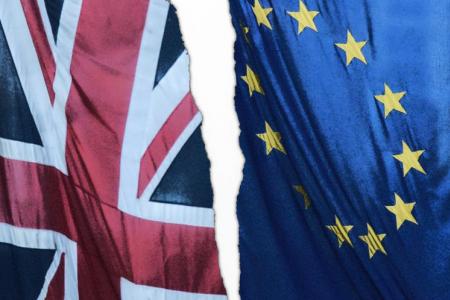Britain to start Brexit-ing today
PM May is expected to have to wait till May before EU leaders engage in discussions
British Prime Minister Theresa May will fire the starting gun today on Brexit, setting in motion a two-year divorce negotiation between the country and 27 other members of the European Union (EU).
Mrs May is expected to pull the trigger at 12.30pm (7.30pm Singapore time) with Britain's permanent representative in Brussels, Mr Tim Barrow, personally handing over a letter to European Council president Donald Tusk, notifying him of Britain's intention to leave the union.
She will address the House of Commons, setting out her aims and sharing the contents of her letter, which is expected to be short.
It has taken Britain nine months to trigger Article 50 of the Lisbon Treaty, since 52 per cent of the country voted in a historic referendum last June in favour of severing ties with the bloc, which it has been a member of since 1973.
While Britain has said it would like negotiations to begin as soon as possible, EU leaders are not likely to come to the bargaining table before May.
Mrs May will have to wait till after the second round of the French presidential election on May 7. The German elections on Sept 24 will also distract leaders from the Brexit discussions.
The EU's chief negotiator, Mr Michel Barnier, has said there will be less than 18 months of real negotiating time within the two-year deadline.
He has said he hopes to begin the process of ratification by the European Parliament by October next year.
But before that, the two sides have plenty of sticking points to deal with, key of which are the rights of EU citizens residing in the United Kingdom and British nationals living in the EU, and whether trade agreements should be part of the Brexit talks.
VOTE
Yesterday, The Guardian reported that the European Parliament will vote next Wednesday on a five-page resolution spelling out its red lines, among them that Britain gives the same rights to EU citizens who move there during the next two years as those already in the country.
Another condition is that a trade deal will be inked only after Britain leaves the EU.
In a speech outlining her Brexit priorities in January, Mrs May said Britain would leave the single market and the customs union, take back control of its borders and seek a new free trade agreement with the EU.
As she embarks on one of the most complex negotiations the government has undertaken, she is at the same time dealing with internal turmoil as Scotland pushes for a second independence referendum, while power-sharing talks in Northen Ireland collapsed on Sunday.
While she reportedly told Scotland's First Minister Nicola Sturgeon during their Monday meeting that she will work at securing a Brexit deal within 18 months, negotiators are less optimistic given the complexity of the issues that need to be ironed out.
Citing a source, Bloomberg yesterday reported that EU officials are still mulling over whether to refer to a transitional phase in its draft negotiation guidelines.
Several events in the past months threatened to derail the divorce proceedings.
In January, Britain's highest court ruled that the government must seek the permission of Parliament to trigger Article 50.
Britain's upper house, the House of Lords, then stood in Mrs May's way, insisting the government should guarantee EU nationals' right to stay in post-Brexit Britain.
It eventually backed down two weeks ago.
Get The New Paper on your phone with the free TNP app. Download from the Apple App Store or Google Play Store now


